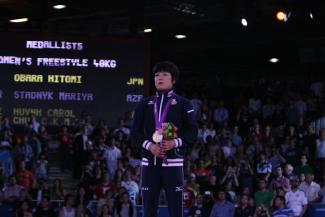Asian C'ship Rivalry-to-Watch: Otoguro and Punia
Sunday, April 11, 2021 - 00:04 By Eric Olanowski

ALMATY, Kazakhstan (April 12) --- Since the ’18 World Championships, 65kg has been one of wrestling’s premier weight classes, and that’s thanks in part to offensive juggernauts Takuto OTOGURO (JPN) and Bajrang PUNIA (IND).
The pair of attack-minded superstars are both entered at 65kg at the upcoming Asian Championships (April 13-18) and are looking to add another continental title to their resumes. But to do so, they’ll likely have to go through each other, which could set up a colossal third meeting between the pair who own a combined four world medals.
Otoguro commands a comfortable 2-0 lead over Punia heading into Almaty. He overcame his Indian rival at the ’18 World Championships and the ’20 Asian Championships and claimed gold both at both events.
Otoguro’s first win over Punia came in history-making fashion. In Budapest, the then-19-year-old defeated Punia in a barn-burning 25-point shootout and became Japan’s youngest-ever male world champion. Later that year, the high-octane match was voted as United World Wrestling’s Freestyle Match of the Year.
In their second meeting, Otoguro changed his approach and used low-level attacks to negate Punia’s world-famous pace. He secured four takedowns from below-the-knee attacks, denied Punia a second consecutive Asian title and reach the top of the continental podium for the first time in his young career.
But since that win in New Delhi, and due to the COVID pandemic, Otoguro has been sidelined from international competition and is set to return to the mat for the first time in 14 months.
Meanwhile, Punia stayed active during the pandemic. He trained in the United States for two months and wrestled in multiple exhibition matches on Flo Wrestling cards. Then, he kick-started the Olympic year with a gold-medal run at the Matteo Pellicone Ranking Series event. In Rome, Punia picked up wins over Tulga TUMUR OCHIR (MGL), Joseph MCKENNA (USA) and Selim KOZAN (TUR) en route to his fifth Ranking Series title.
The Asian Championships begin on Tuesday with Greco-Roman wrestling, but freestyle action starts on Saturday (April 16) in Almaty, Kazakhstan.
65kg Asian Championship Entries:
Bajrang BAJRANG (IND)
Morteza Hassanali GHIASI CHEKA (IRI)
Mohammed Al Jawad Zuhair K KAREEM (IRQ)|
Takuto OTOGURO (JPN)
Daulet NIYAZBEKOV (KAZ)
Alibek OSMONOV (KGZ)
Yongseok JEONG (KOR)
Junsik YUN (KOR)
Bilguun SARMANDAKH (MGL)
Chamara Milinda Perera WEERASINGHEGE (SRI)
Mustafo AKHMEDOV (TJK)
Kerim HOJAKOV (TKM)
Nodir RAKHIMOV (UZB)


Share your thoughts.
Comments